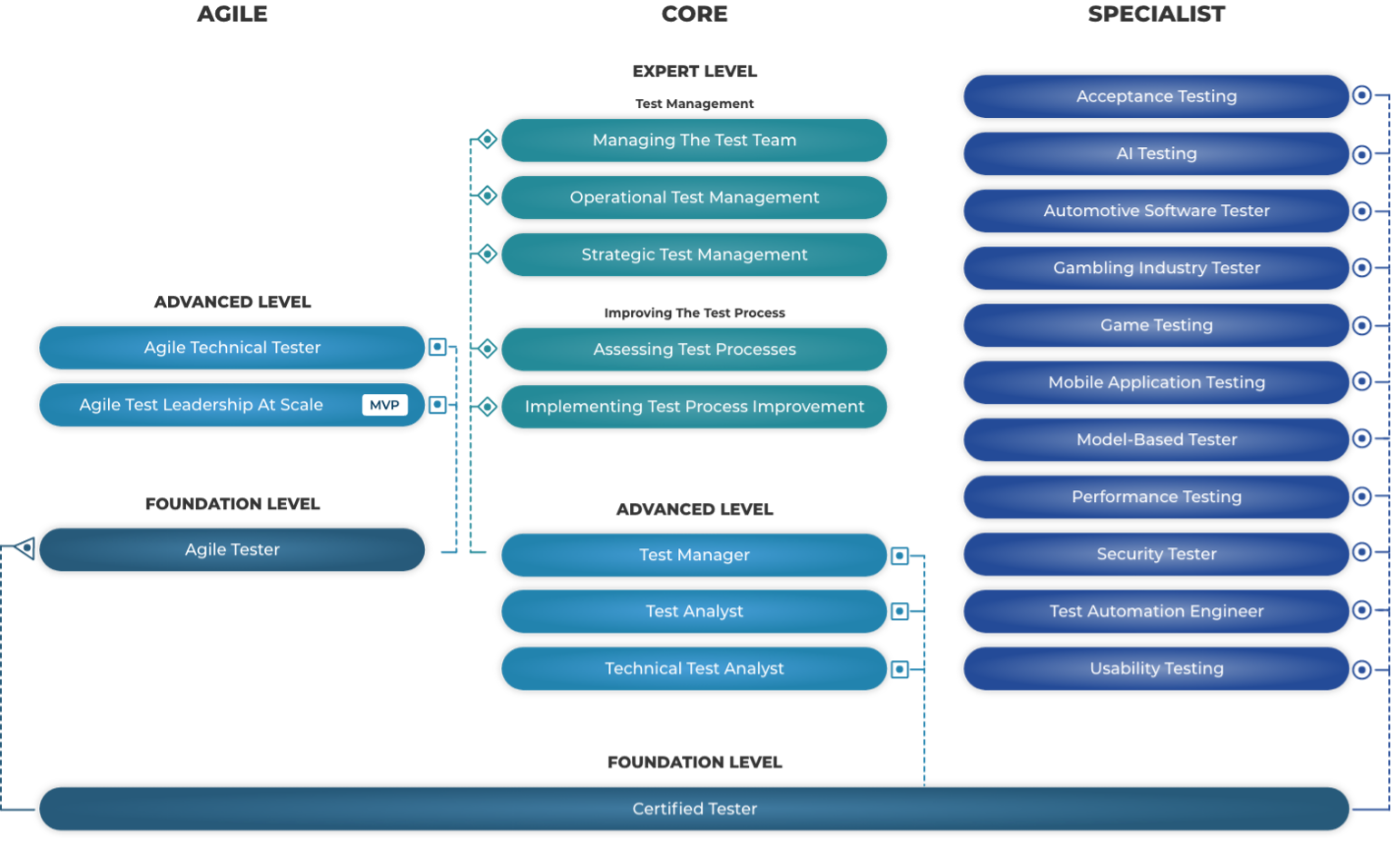Malfunctioning software can lead to various issues, including time and cost overruns, damage to reputation, security vulnerabilities and even death depending on the industry where the software is used. To address software defects, manage errors, and ensure quality, the field of software testing has emerged. Software testing is the process of identifying errors in software, mitigating the risks associated with these errors, and enhancing overall software quality. For those aiming to advance in this field and demonstrate their competence, obtaining software testing certifications and adding them to their resume is crucial.
In the field of Software Testing, there are several institutions where you can obtain certifications to express your competencies. Among the certifications that individuals new to this field or those already in specific positions in the industry can obtain, the Certified Tester Foundation Level (CTFL) certification, which is one of the entry level certifications by the Software Testing Qualifications Board (ISTQB®) with global validity could be a good choice.

The Foundation Level certification forms the basis of the International Software Testing Qualifications Board (ISTQB®) Certified Tester Expert Plan. It provides practical knowledge about fundamental concepts of software testing for test professionals, software engineers, and test engineers. There are no prerequisites to obtain the Foundation Level certification. To pass the exam, which consists of 40 questions, you need to answer at least 26 questions correctly, achieving a minimum of 65%.
Obtaining the Foundation Level certification is a prerequisite for participating in more advanced and specialized certification exams. By passing ISTQB® exams, you can earn various certifications. Keep in mind that as certifications become more specialized, prerequisites and exam content may vary. For example, in the Foundation Level exam, questions are available in both Turkish and English. However, for other specialized certifications, the exam language is exclusively English. Additionally, having some industry experience beyond the Foundation Level can enhance your performance in these exams.
There are three alternative paths to choose after getting the foundation level certificate:
First path is the Agile group which focusses on competencies related to agile software developing. The Foundation Level is prerequisite for those who want to advance in this field and get Agile Tester certificate.
Agile, compared to other software developing principles, has a new-school aproach. Thus, the individuals who follow the agile software development approach and recognize the importance of agile practices can opt for this certification as a starting point in their careers. After obtaining this certification, they can also pursue advanced level certifications within this group.
Second is a Core certifications group that assess fundamental testing qualifications and competency.
Lastly, there are Specialist certifications for those who wish to specialize further in specific areas within the test domain.
Certificates applicable to Agile Testers:
- Certified Tester Foundation Level Agile Tester (CTFL-AT)
- Certified Tester Agile Test Leadership at Scale (CT-ATLaS)
- Certified Tester Advanced Level Agile Technical Tester (CTAL-ATT)
Certificates applicable to Core Group:
- Certified Tester Advanced Level Test Analyst (CTAL-TA)
- Certified Tester Advanced Level Technical Test Analyst (CTAL-TTA)
Certificates applicable for Test Management:
- Certified Tester Advanced Level Test Manager (CTAL-TM)
- Certified Tester Expert Level Test Management Managing the Test Team (CTEL-TM-MTT)
- Certified Tester Expert Level Test Management Operational Test Management (CTEL-TM-OTM)
- Certified Tester Expert Level Test Management Strategic Test Management (CTEL-TM-SM)
Certificates applicable to Specialist Group:
- Certified Tester AI Testing (CT-AI)
- Certified Tester Game Testing (CT-GaMe)
- Certified Tester Performance Testing (CT-PT)
- Certified Tester Test Automation Engineer (CT-TAE)
- Certified Tester Usability Testing (CT-UT)
- Certified Tester Automotive Software Tester (CT-AuT)
- Certified Tester Acceptance Testing (CT-AcT)
- Certified Tester Gambling Industry Tester (CT-GT)
- Certified Tester Mobile Application Testing (CT-MAT)
- Certified Tester Security Tester (CT-SEC)
You can choose the certificate you want to take according to the area you want to improve yourself. To get the certificate, we share with you detailed information such as sample questions, syllabus, topic scope for the ISTQB® exam preparation. You can access the certificates you can get from the Software Testing Qualifications Board (ISTQB®) institution, the prerequisites for these certificates, detailed information, explanations and certificate competency topic contents from here.
There are various type of certifications other than ISTQB® certifications. Some of them:
- CAST (Certified Associate in Software Testing)
- CSQA (Certified Software Quality Analyst Certification)
- Certified Quality Engineer (CQE)
- Certified Manager of Software Testing (CMST)
- Certified Software Tester (CSTE)
- Software Tester Accredited Certification
- Software Test Manager Accredited Certification
- Software Test Automator Accredited Certification
- Certified Associate in Software Quality: (CASQ)
- Certified Manager of Software Quality: (CMSQ)

